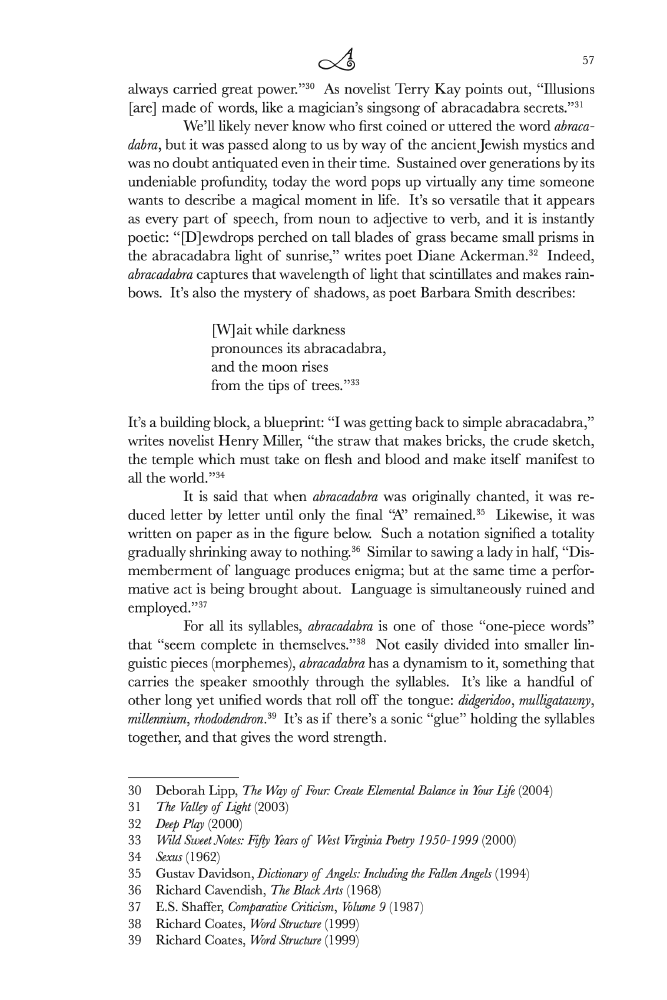
A
always carried great power." 0 As novelist Terry Kay points out, "Illusions
[are] made of words, like a magician's singsong of abracadabra secrets." 1
We'll likely never know who first coined or uttered the word abracadabra,
but it was passed along to us by way of the ancient Jewish mystics and
was no doubt antiquated even in their time. Sustained over generations by its
undeniable profundity, today the word pops up virtually any time someone
wants to describe a magical moment in life. It's so versatile that it appears
as every part of speech, from noun to adjective to verb, and it is instantly
poetic: "[D]ewdrops perched on tall blades of grass became small prisms in
the abracadabra light of sunrise," writes poet Diane Ackerman. Indeed,
abracadabra captures that wavelength of light that scintillates and makes rainbows.
It's also the mystery of shadows, as poet Barbara Smith describes:
[W]ait while darkness
pronounces its abracadabra,
and the moon rises
from the tips of trees."
It's a building block, a blueprint: "I was getting back to simple abracadabra,"
writes novelist Henry Miller, "the straw that makes bricks, the crude sketch,
the temple which must take on flesh and blood and make itself manifest to
all the world." 4
It is said that when abracadabra was originally chanted, it was reduced
letter by letter until only the final "A" remained. Likewise, it was
written on paper as in the figure below. Such a notation signified a totality
gradually shrinking away to nothing. Similar to sawing a lady in half, "Dismemberment
of language produces enigma; but at the same time a performative
act is being brought about. Language is simultaneously ruined and
employed." 7
For all its syllables, abracadabra is one of those "one-piece words"
that "seem complete in themselves." 8 Not easily divided into smaller linguistic
pieces (morphemes), abracadabra has a dynamism to it, something that
carries the speaker smoothly through the syllables. It's like a handful of
other long yet unified words that roll off the tongue: didgeridoo, mulligatawny,
millennium, rhododendron. 9 It's as if there's a sonic "glue" holding the syllables
together, and that gives the word strength.
0 Deborah Lipp, The Way of Four: Create Elemental Balance in Your Life (2004)
1 The Valley of Light (200 )
Deep Play (2000)
Wild Sweet Notes: Fifty Years of West Virginia Poetry 1950-1999 (2000)
4 Sexus (1962)
5 Gustav Davidson, Dictionary of Angels: Including the Fallen Angels (1994)
6 Richard Cavendish, The Black Arts (1968)
7 E.S. Shaffer, Comparative Criticism, Volume 9 (1987)
8 Richard Coates, Word Structure (1999)
9 Richard Coates, Word Structure (1999)